
 i_need_contribute
i_need_contribute

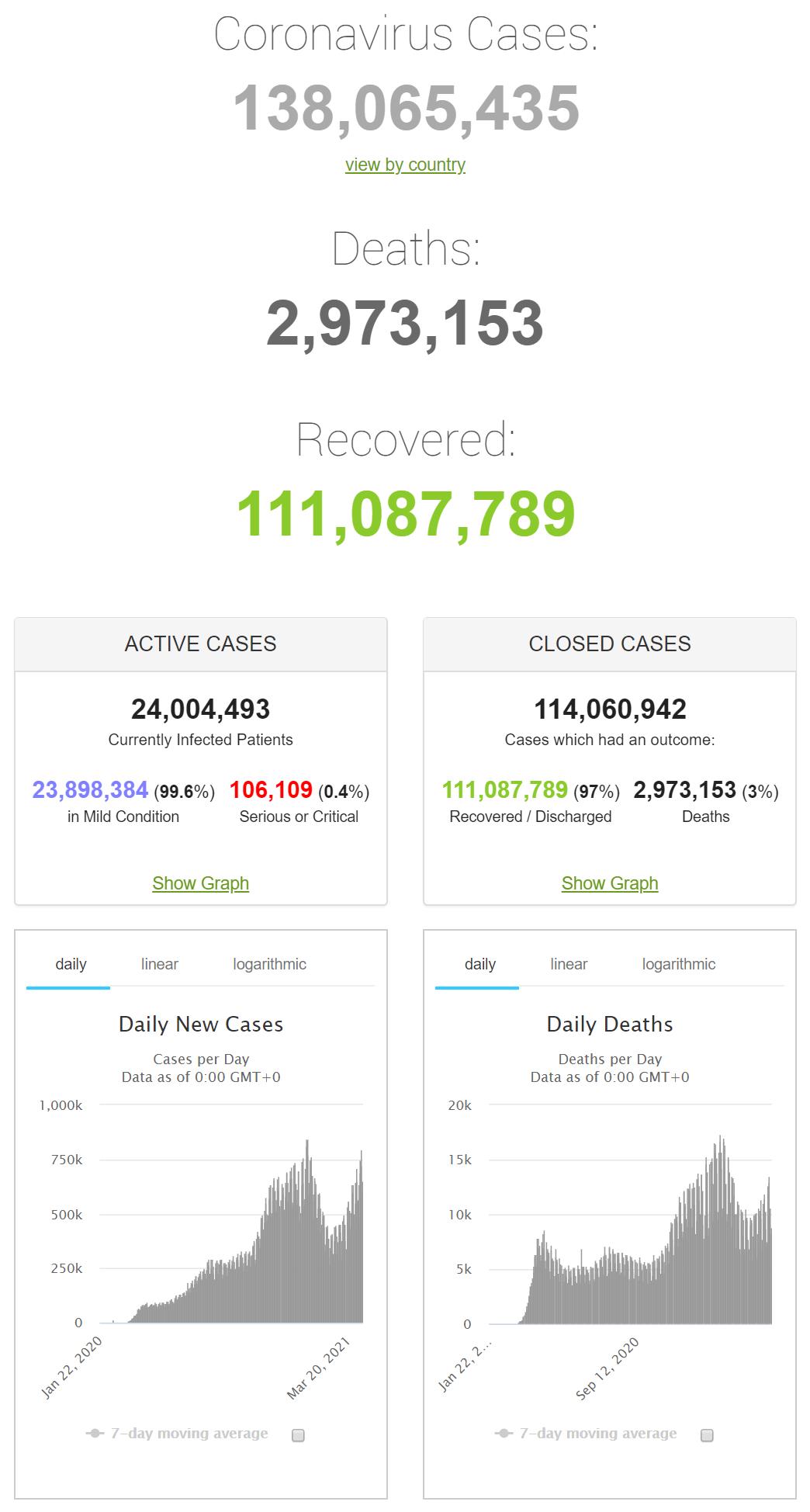
|
Country, |
Total |
New |
Total |
|
World |
138,007,066 |
+735,593 |
2,971,287 |
|
32,070,784 |
+77,720 |
577,179 |
|
|
13,871,321 |
+185,248 |
172,115 |
|
|
13,601,566 |
+80,157 |
358,718 |
|
|
5,106,329 |
+39,113 |
99,480 |
|
|
4,657,883 |
+8,173 |
103,601 |
|
|
4,375,814 |
+2,472 |
127,123 |
|
|
3,962,760 |
+59,187 |
34,455 |
|
|
3,793,033 |
+13,447 |
115,088 |
|
|
3,376,548 |
+6,292 |
76,625 |
|
|
3,031,836 |
+10,772 |
79,408 |
|
|
2,599,850 |
+13,227 |
59,126 |
|
|
2,579,000 |
+27,001 |
58,174 |
|
|
2,569,314 |
+16,377 |
66,482 |
|
|
2,281,840 |
+1,627 |
209,702 |
|
|
2,118,212 |
+24,760 |
65,055 |
|
|
1,872,785 |
+11,680 |
37,758 |
|
|
1,659,707 |
+6,387 |
55,489 |
|
|
1,585,091 |
+3,870 |
28,086 |
|
|
1,577,526 |
+5,702 |
42,782 |
|
|
1,559,960 |
+847 |
53,423 |
|
|
1,364,025 |
+6,685 |
16,822 |
|
|
1,088,710 |
+5,790 |
24,518 |
|
|
1,078,562 |
+7,546 |
23,392 |
|
|
1,012,373 |
+3,883 |
25,441 |
|
|
941,078 |
+8,179 |
14,796 |
|
|
927,229 |
+1,753 |
23,503 |
|
|
884,783 |
+8,571 |
15,286 |
|
|
836,334 |
+176 |
6,309 |
|
|
828,173 |
+408 |
16,923 |
|
|
729,920 |
+4,318 |
15,619 |
|
|
728,078 |
+2,837 |
23,980 |
|
|
697,985 |
+6,028 |
9,891 |
|
|
672,090 |
+2,790 |
7,937 |
|
|
648,745 |
+3,572 |
5,808 |
|
|
581,263 |
+2,313 |
9,748 |
|
|
508,802 |
+2,516 |
9,425 |
|
|
502,961 |
+684 |
8,915 |
|
|
499,839 |
+1,985 |
6,738 |
|
|
487,697 |
+2,022 |
1,537 |
|
|
400,228 |
+951 |
6,773 |
|
|
378,059 |
+2,944 |
14,746 |
|
|
372,038 |
+870 |
10,716 |
|
|
363,940 |
+1,767 |
1,345 |
|
|
359,121 |
+329 |
6,173 |
|
|
347,589 |
+519 |
17,351 |
|
|
337,635 |
+754 |
2,373 |
|
|
301,103 |
+4,017 |
9,054 |
|
|
294,874 |
+1,936 |
6,358 |
|
|
290,129 |
+1,374 |
3,894 |
|
|
289,601 |
+2,457 |
3,978 |
|
|
283,084 |
+989 |
12,469 |
|
|
280,984 |
+460 |
3,058 |
|
|
274,604 |
+1,664 |
9,396 |
|
|
273,825 |
+2,016 |
3,260 |
|
|
272,767 |
+1,911 |
2,901 |
|
|
258,637 |
+598 |
3,397 |
|
|
250,273 |
+1,544 |
1,419 |
|
|
242,364 |
+544 |
5,438 |
|
|
241,684 |
+354 |
4,803 |
|
|
240,141 |
+2,599 |
4,978 |
|
|
238,869 |
+563 |
2,446 |
|
|
232,512 |
+1,568 |
3,230 |
|
|
227,976 |
+1,175 |
3,714 |
|
|
227,836 |
+1,049 |
4,130 |
|
|
225,343 |
+2,799 |
3,044 |
|
|
212,130 |
+823 |
12,526 |
|
|
205,322 |
+2,013 |
7,057 |
|
|
204,053 |
+726 |
3,775 |
|
|
196,086 |
+306 |
4,861 |
|
|
191,979 |
+981 |
340 |
|
|
176,972 |
+1,160 |
1,815 |
|
|
174,364 |
+1,335 |
1,798 |
|
|
169,504 |
+828 |
2,830 |
|
|
163,911 |
+74 |
2,061 |
|
|
158,789 |
+1,060 |
566 |
|
|
149,430 |
+2,257 |
1,595 |
|
|
147,147 |
+991 |
2,394 |
|
|
128,752 |
+234 |
2,326 |
|
|
118,799 |
+154 |
3,137 |
|
|
115,080 |
+638 |
1,049 |
|
|
110,688 |
+542 |
1,775 |
|
|
108,355 |
+537 |
2,002 |
|
|
105,008 |
+1,009 |
688 |
|
|
95,620 |
+226 |
602 |
|
|
94,643 |
+224 |
1,391 |
|
|
91,410 |
+75 |
761 |
|
|
90,599 |
+227 |
1,532 |
|
|
90,435 |
+9 |
4,636 |
|
|
90,218 |
+154 |
1,229 |
|
|
88,445 |
+1,060 |
476 |
|
|
85,291 |
+177 |
634 |
|
|
82,564 |
+286 |
877 |
|
|
68,871 |
+79 |
794 |
|
|
66,657 |
+168 |
2,054 |
|
|
64,062 |
+182 |
777 |
|
|
34,575 |
+965 |
97 |
|
|
10,122 |
+46 |
92 |
|
|
9,363 |
+47 |
184 |
|
|
2,714 |
+9 |
35 |
Retrieved from: https://www.worldometers.info/coronavirus/
From CNN's Blake Essig, Emiko Jozuka and Ben Westcott
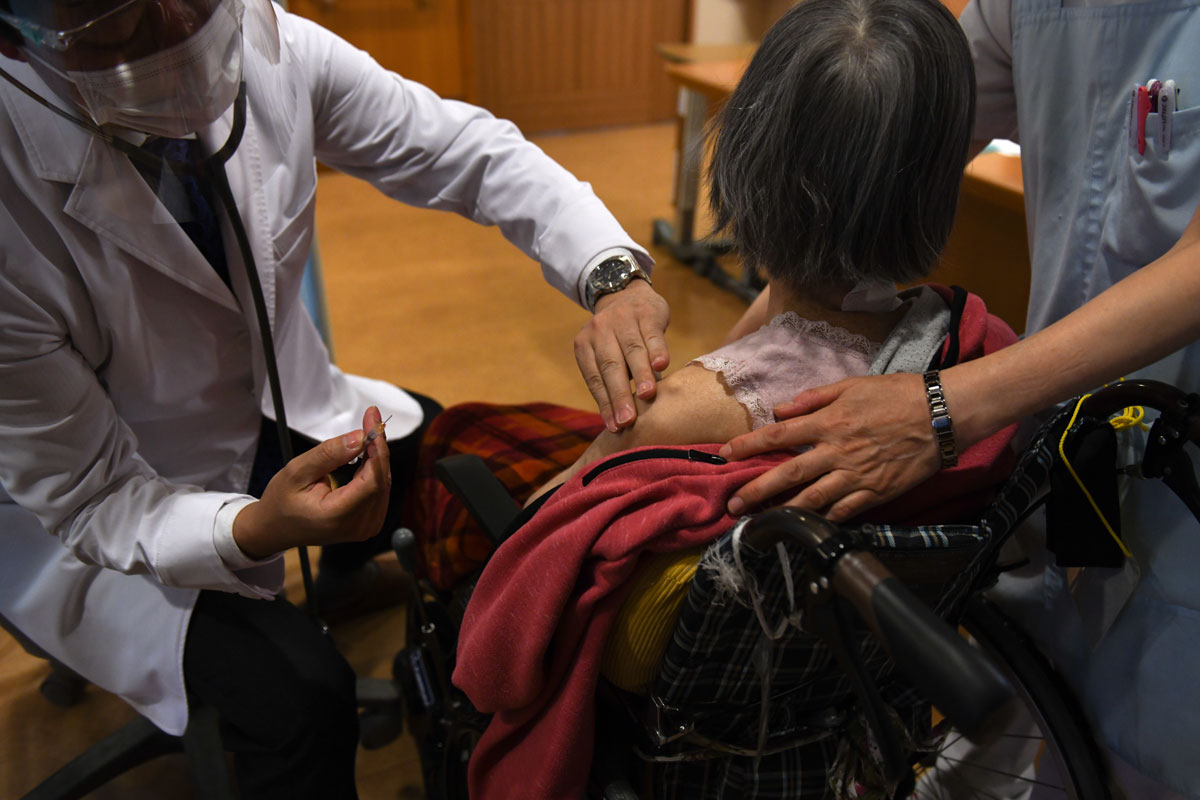
A doctor administers a dose of the Pfizer-BioNTech Covid-19 vaccine at a nursing home in Kanagawa prefecture, Japan, on April 12. Noriko Hayashi/Bloomberg/Getty Images
When 2020 Tokyo Olympics volunteers in recent weeks asked officials how they'll be protected from Covid-19, given the foreign athletes pouring into Japan for the event and the country's low vaccination rate, the answer was simple.
They'll be given a small bottle of hand sanitizer and two masks each.
"They don't talk about vaccines, they don't even talk about us being tested," said German volunteer Barbara Holthus, who is director of Sophia University's German Institute for Japanese Studies, in Tokyo.
With 100 days to go until the Games, already postponed a year due to the pandemic, questions remain over how Tokyo can hold a massive sporting event and keep volunteers, athletes, officials -- and the Japanese public -- safe from Covid-19.
That concern has been amplified by Japan's battle with a looming fourth wave. The country passed 500,000 total coronavirus cases on Saturday, and some prefectures are again tightening their restrictions as daily infections grow. Hideaki Oka, a professor at Saitama Medical University, said Japan may not be able to contain the latest wave before the Games begin on July 23.
While Prime Minister Yoshihide Suga reiterated Monday his pledge to secure 100 million vaccine doses by the end of June, so far Japan has only vaccinated about 1.1 million of its 126 million people -- less than 1% of the population. Only 0.4% have received two doses.
From CNN's Manveena Suri in New Delhi
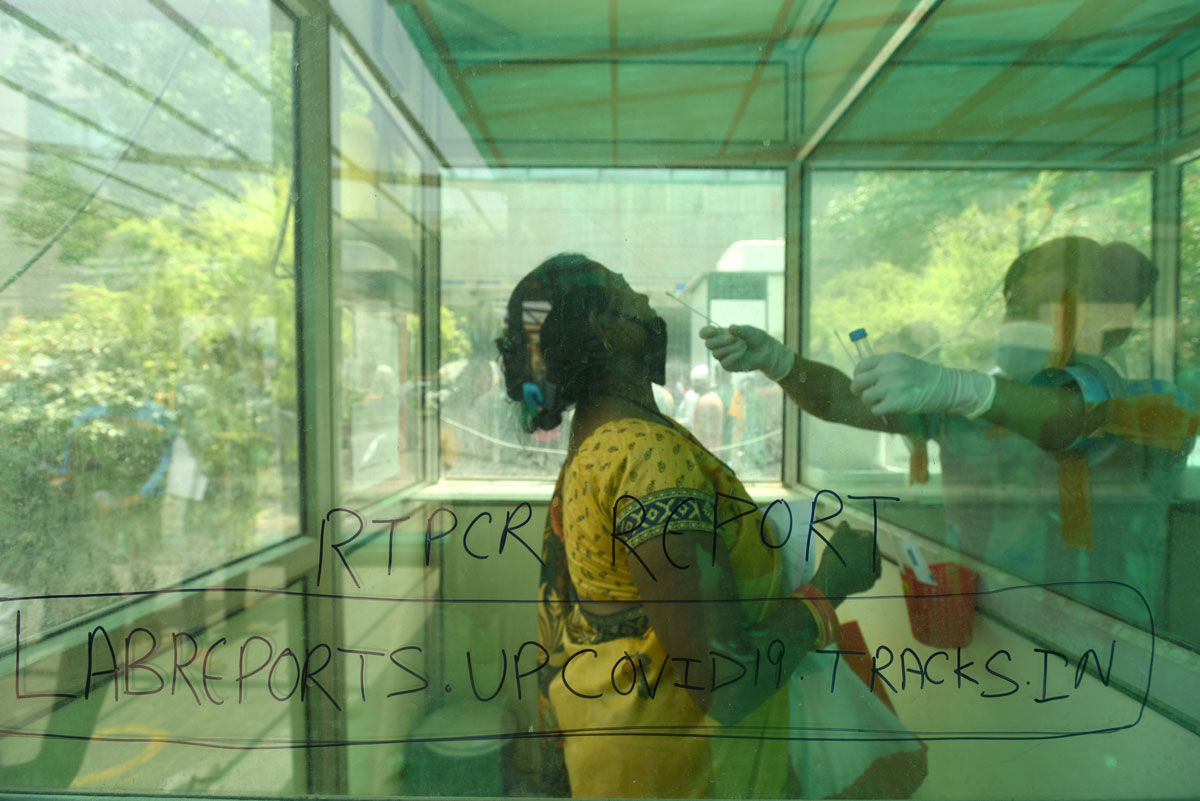
A health worker collects a swab sample from a woman for a Covid-19 test, at Sector 30 District Hospital, on April 12 in Noida, India. Sunil Ghosh/Hindustan Times/Getty Images
India reported 184,372 new cases of coronavirus on Wednesday, the highest single-day figure since the beginning of the pandemic, according to data from the Indian Ministry of Health.
That's one of the world's highest single-day case counts this week. To put that in perspective, the United States reported more than 77,000 cases on Tuesday and Brazil reported more than 82,000 -- both far below India's count, according to data from Johns Hopkins University.
The ministry also reported 1,027 additional related deaths, marking the first time India has reported more than 1,000 new daily deaths since October.
The new figures bring the country's totals to 13,873,825 cases and 172,085 related deaths.
Massive pilgrimage: Cases are on the rise in the city of Haridwar, in Uttarakhand state, where the month-long Kumbh Mela religious festival is taking place. Millions of Hindus from across the country have traveled to Haridwar to bathe in the Ganges River and attend prayers together.
Monday marked the first "auspicious" day of the festival, and up to 2.4 million people took a dip in the Ganges, police officials told CNN. The second bathing day kicked off on Wednesday, and the final one will take place on April 27.
Haridwar has seen more than 1,000 new cases in the past two days alone, according to figures released by the state health department. To put that in context, the city reported just 70 new cases on March 31, the day before the festival began.
New restrictions: Tough restrictions will go into effect Wednesday evening in the hard-hit Maharashtra state, lasting until May 1.
Public gatherings will be capped at four people. People are urged to work from home and follow a voluntary curfew. Only essential travel and services will be allowed across the state. Shopping centers, malls, film shoots and beaches will be closed, while hotels and restaurants will only be allowed to provide delivery and takeaway services.
From CNN’s David McKenzie in Johannesburg
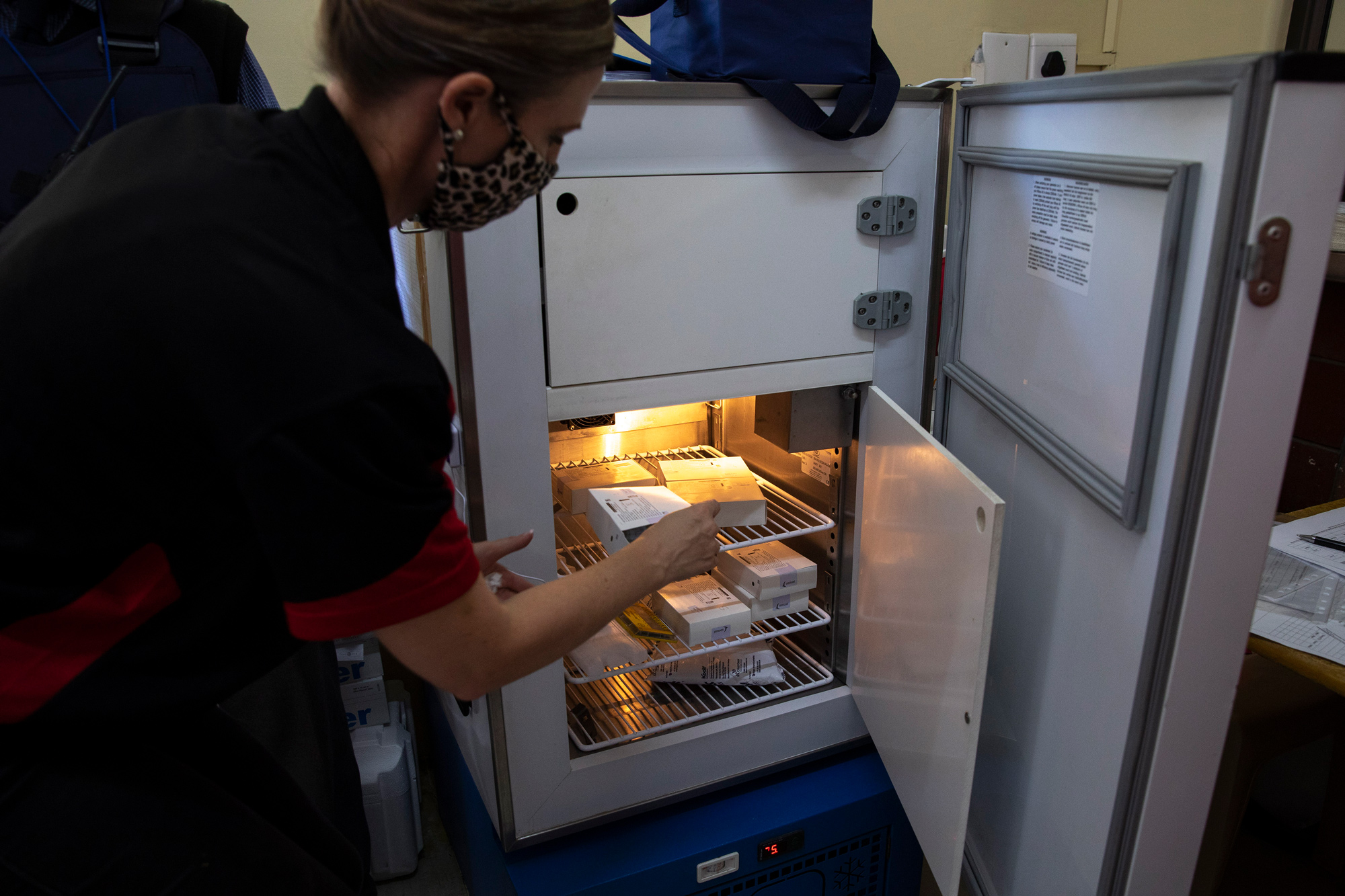
A healthcare worker takes out the Johnson & Johnson COVID-19 coronavirus vaccine from a temperature controlled fridge at the Klerksdorp Hospital in South Africa on February 18. Phil Magakoe/AFP/Getty Images
South Africa’s Health Minister Zweli Mkhize on Tuesday evening announced the suspension of South Africa’s rollout of the Johnson & Johnson vaccine, stressing that South African scientists believe it will only be a temporary suspension.
Mkhize said the decision was made after the US Food and Drug Administration (FDA) recommended the United States pause its rollout of the single dose vaccine because of six reported cases of a rare and severe form of blood clot among more than 6.8 million doses of the vaccine administered in the US.
The minister said that they had not received any reports of blood clots in the more than 250,000 health care workers already vaccinated with the Johnson & Johnson vaccine, as part of a large-scale trial in South Africa. Full rollout of the vaccine is yet to commence.
“We hope that the deliberations will only take a few days. Given the preliminary research on hand, our scientists are confident that the FDA decision is only on a precautionary basis and we expect that this will not result in a complete withdrawal of the Johnson & Johnson vaccine,” said Mkhize.
South Africa has banked heavily on the Johnson & Johnson vaccine after the Oxford-AstraZeneca vaccine was shown to be less effective against mild and moderate cases of a strain of the virus discovered in South Africa.
At least 30 million doses of the Johnson & Johnson vaccine have been secured, the minister said, adding that the country has also secured 30 million doses of the Pfizer vaccine this fiscal year.
From CNN’s Arnaud Siad and Mick Krever
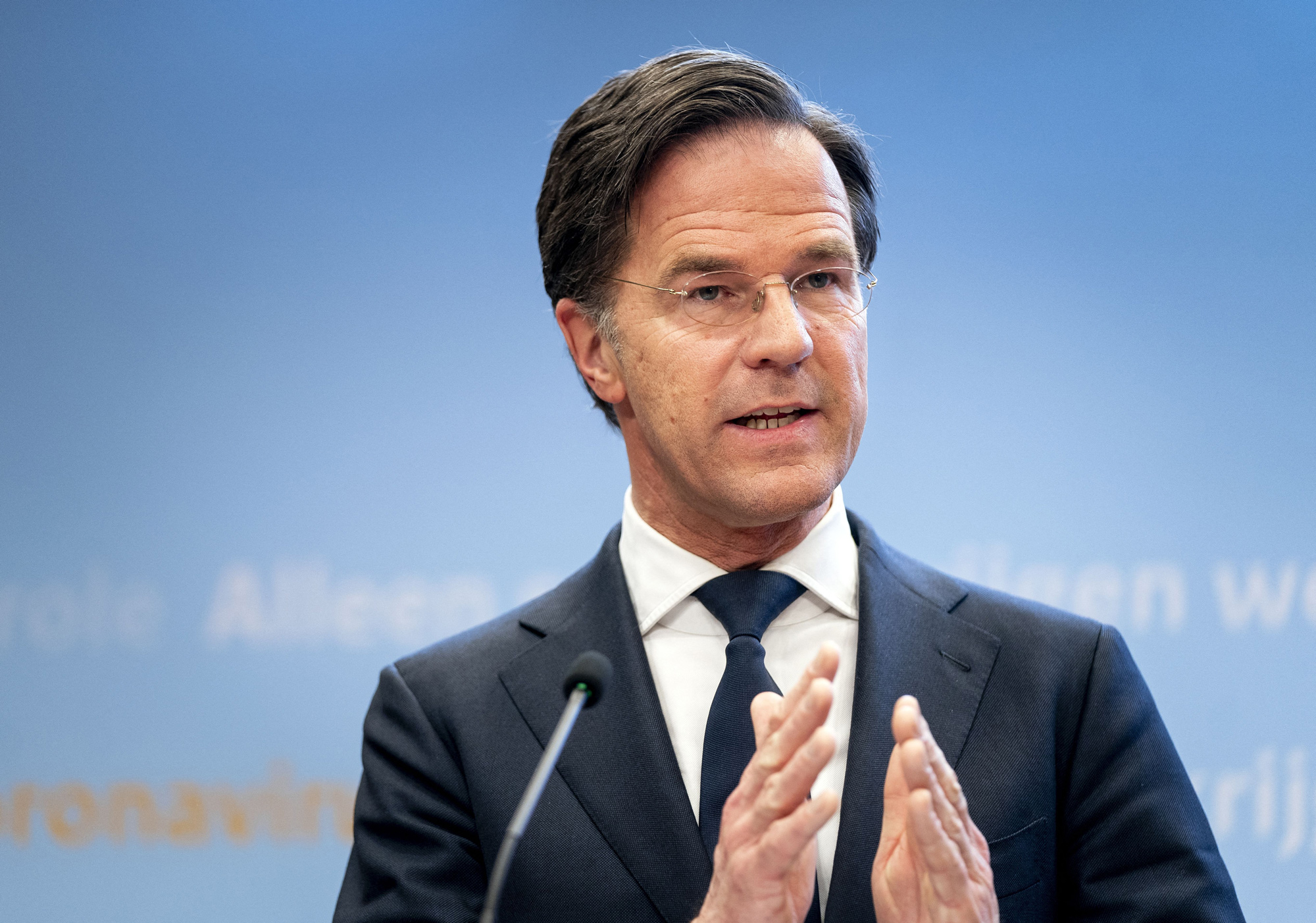
Dutch outgoing Prime Minister Mark Rutte speaks during a press conference on Covid-19 measures in the Netherlands, in The Hague, on April 13. Bart Maat/ANP/AFP/Getty Images
Most lockdown measures currently in place to tackle the Covid-19 pandemic in the Netherlands must remain in place until at least April 28, Prime Minister Mark Rutte said on Tuesday.
“The first step in the opening plan will be taken on April 28 at the earliest. Until then, the current coronavirus measures will continue to apply,” the government said in a statement.
The opening plan will consist of authorizing terraces and shops to open under certain conditions, the lifting of curfews and authorizing two guests per household instead of one.
“This is possible at the earliest on April 28 and only if the number of hospital admissions of people with Covid-19 is clearly decreasing,” the statement adds.
It also says that the government will make an announcement on April 20 whether the opening plan can proceed on April 28.
Under current restrictions, the country is under an evening curfew and there is a ban on public gatherings of more than two people.
From CNN’s Virginia Langmaid

A syringe is filled with a dose of the Johnson & Johnson Janssen Covid-19 vaccine at a vaccination site inside Reuther Hall at Forty Acres on March 13 in Delano, California. Patrick T. Fallon/AFP/Getty Images
The World Health Organization will wait for further information on adverse events potentially related to Johnson & Johnson’s Covid-19 vaccine, the organization said Tuesday.
“We’re watching closely, waiting for EMA and FDA reviews, and monitoring the global database of adverse event reports to see if there have been cases anywhere else,” WHO said in an email to CNN, referring to the European Medicines Agency and US Food and Drug Administration. “It will take a little time to review the data.”
According to WHO, the organization’s Global Advisory Committee on Vaccine Safety will communicate any findings on these reports following a review of data. WHO encouraged national regulators to work together to compile information on adverse events, but said that events are still incredibly rare.
“It is important to remember that we are witnessing the largest mass vaccination campaign in history, and some rare reactions are to be expected,” the organization said.
According to Gavi, the organization which handles manufacturing agreements for WHO’s vaccination efforts, the COVAX program has agreed to access 500 million doses of Johnson & Johnson’s vaccine for the purpose of global distribution.
Last week, WHO updated its recommendations on AstraZeneca’s vaccine to indicate there is a “plausible” link between AstraZeneca’s vaccine and clotting events.
Retrieved from: https://edition.cnn.com/world/live-news/coronavirus-pandemic-vaccine-updates-04-14-21/index.html
By Vivian Yee, Adam Rasgon and Asmaa al-Omar

People sitting near the Dome of the Rock at the Aqsa Mosque compound, Islam’s third holiest site, in the old city of Jerusalem on Monday.Credit...Ahmad Gharabli/Agence France-Presse — Getty Images
Millions of Muslims on Tuesday began celebrating a second Ramadan in the middle of the pandemic, although in many countries the first day of the holy month offered the promise of a Ramadan with fewer restrictions than last year.
Mosques across the Middle East and other parts of the world were closed for prayer last year, and lockdowns prevented festive gatherings with friends and family. In Jerusalem, for instance, the Old City was largely empty and the Aqsa Mosque compound was closed to the public, as coronavirus cases were surging.
But a large degree of normalcy was back on Tuesday: The Old City’s narrow alleys were crowded, sweet shops were preparing Ramadan desserts, clothing stores were open and the Aqsa compound was welcoming worshipers.
“Last year, I felt depressed and I didn’t know how long the pandemic would last,” said Riyad Deis, a co-owner of a spice and dried fruit shop in the Old City, while selling whole pieces of turmeric and Medjool dates to a customer. “Now, I’m relaxed, I have enough money to provide for my family and people are purchasing goods from my shop — it’s a totally different reality.”
The enthusiasm of some didn’t mean the Ramadan would go as normal. Across several countries in the Middle East, the authorities imposed limitations on customs and festivities, requiring that mosques enforce social distancing and telling worshipers to bring their own prayer rugs and to wear face masks.
In Dubai, Saudi Arabia and Egypt, taraweeh, the optional extra prayers that worshipers can observe at night, were capped at half an hour. No one will also be allowed to spend the night in a mosque, as is common during the last 10 days of Ramadan.
Mosques around the region were also prohibited from serving the fast-breaking meal of iftar or the predawn meal of suhoor. Though Muslims could still gather for those meals with friends and family, the authorities asked them to limit those gatherings this year.
In Jerusalem, Omar Kiswani, the director of Al Aqsa Mosque, said he was overjoyed that the compound was open to worshipers, but still urged caution.
“These are times of great happiness — we hope the blessed Aqsa Mosque will return to its pre-pandemic glory — but these are also times of caution because the virus is still out there,” Mr. Kiswani said.
In Egypt, government officials and prominent television hosts linked to the authorities warned Egyptians of a third wave of infections as Ramadan approached, hinting that another curfew or other lockdown restrictions could be imposed if cases rose.
“If you want the houses of God to remain open,” Nouh Elesawy, an official who oversees mosques at the Egyptian Ministry of Endowments, said earlier this month, “adhere to the precautionary procedures and regulations.”
The Ramadan restrictions may hit the hardest in poor neighborhoods, where residents depend on iftar banquets usually sponsored by wealthy individuals or organizations. For those people, feasting and Ramadan gifts are likely to be rarer, with tourism still at a trickle and many small businesses still suffering from the economic effects of the pandemic.
In Lebanon and Syria, the pandemic has worsened economic crisis that will likely squeeze people’s ability to enjoy the holy month, more than the governments’ limited restrictions aimed at curbing the spread of the coronavirus.
In Syria, where experts say the official infection and death numbers for Covid-19 are far below the reality, the government has few restrictions in place. Worshipers will even be allowed to stand in line inside of mosques to pray together after breaking their fast, the Syrian Ministry of Religious Affairs said.
In Lebanon, which emerged recently from a strict lockdown, shops and restaurants can operate regularly during the day but must offer only delivery service during a nighttime curfew from 9:30 p.m. to 5 a.m.
In other news from around the world:
· Japan has begun vaccinating 36 million people over age 65, the first time shots have been made available to the public during the country’s slow vaccine rollout. Officials said that 1,139 people nationwide had received doses on Monday, and that doses to cover all Japanese above the age threshold would reach municipal health facilities by the end of June. Although Japan has weathered the pandemic better than most countries, the pace of its vaccination effort, which until now had only covered 1.1 million frontline medical workers, has sparked public criticism and raised questions about readiness for the Tokyo Summer Olympics in just over three months.
· Scotland on Tuesday moved forward plans to loosen its coronavirus lockdown, a day after the British government eased many restrictions in England. New rules beginning Friday will permit Scots to meet outdoors in groups of up to six adults from six households. The current rules restrict travel and set the maximum group size at four, from two households. Restrictions on shops and outdoor service in pubs, now relaxed in England, are scheduled to remain in Scotland until April 26.
· Austria’s health minister resigned on Tuesday, citing personal health problems that he said have been exacerbated by the grueling job of helping lead the country’s response to the pandemic. “It feels like it has not been 15 months, but 15 years,” the minister, Rudolf Anschober, said in a statement. Mr. Anschober, 60, was appointed in January last year, as a Green party minister in a Conservative-led coalition, and has been one of the main faces of Austria’s coronavirus response. “In the worst health crisis in decades, the republic needs a health minister who is 100 percent fit. That is not currently me,” he said.
· France will suspend all flights to and from Brazil, because of growing worries about the virus variant spreading there. “We see that the situation is getting worse” in Brazil, Prime Minister Jean Castex told lawmakers. The country previously permitted essential travel from Brazil, subject to testing and isolation requirements.
· The World Health Organization on Monday evening called on governments to suspend the sale of live wild mammals in food markets to help prevent the emergence of new diseases. “Traditional markets, where live animals are held, slaughtered and dressed, pose a particular risk for pathogen transmission to workers and customers alike,” the agency said in a statement. Animals are the source of more than 70 percent of emerging infectious diseases in humans, it said. Early in the pandemic, Chinese officials suggested that the coronavirus outbreak might have started at a market. But W.H.O. experts said in a report last year that the role of animal markets in the story of the pandemic was still unclear.